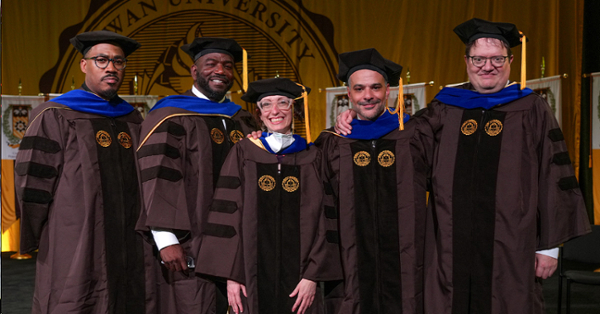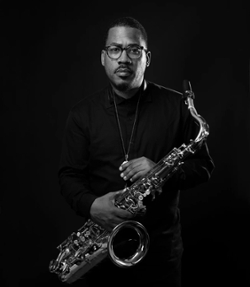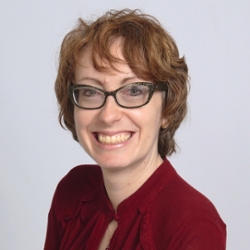First Ph.D. in creativity class graduates from one-of-a-kind program
First Ph.D. in creativity class graduates from one-of-a-kind program

For countless reasons, many people would like to be more creative.
What most don’t know is that creativity can be learned. It can be mined, explored and expanded.
Celebrating what may be the only program of its type in the world, Rowan University graduated its first Ph.D. in creativity students during a doctoral hooding ceremony May 9.
The class of five started the program as strangers at a different university and approached the degree from music, theater, education, branding and planning professions. They graduated as colleagues and friends.
The program pairs students with leaders in their field of study for a high intensity, low-residency experience in which they complete their doctoral degree in just three years.
“Students work closely with their advisors, their mentors, and no two students are from the same field,” said Jonathan Fineberg, Ph.D., who developed the program at the University of the Arts in Philadelphia.
Following that school’s sudden closure last year, Fineberg and Associate Director Audrey Ellis felt Rowan’s culture and leadership made the institution an ideal new home.
“What we’re building here is truly unique, the only accredited Ph.D. in creativity in the world,” Fineberg said.
Creative, by design
The first graduating class at Rowan was made up of highly creative doctoral candidates, but the program is not about creative pursuits, per se. Rather, it is centered on the application of creativity, the methodology behind creative mindsets, and the use of research standards in creative exploration.
The Ph.D. in creativity serves students who have already achieved professional expertise in a given field and prepares them to develop industry-altering dissertation projects with the potential to transform their fields.
Students do not take traditional classes and are not on campus for most of their work. Rather, they begin in a two-week “creativity immersion” in which, working with the Barnes Foundation, they participate in a series of intense, curated arts experiences intended to transform their approach to creative thinking.
The required dissertation is, by design, a departure from hundreds of years of doctoral research precedent. Rather than producing a voluminous study that might never be read by a public audience, the students develop book-length projects with the intention of publishing them.
A disparate group
Rowan’s inaugural graduating class included world-renowned jazz saxophonist James Brandon Lewis; Jennifer Schaupp, a theatre professor from Pittsburgh; Andrew Lee Carlson, a professional planner with the Department of Defense; international branding expert Kehinde Bademosi; and musician and educator Jamal Jones.
Schaupp, a theatre professor from Pittsburgh; Andrew Lee Carlson, a professional planner with the Department of Defense; international branding expert Kehinde Bademosi; and musician and educator Jamal Jones.
The newly minted graduates said the first doctorate to be offered through the Ric Edelman College of Communication & Creative Arts challenged them to embrace creativity as a vehicle through which they could address a wide range of research challenges.
Lewis, a New York City-based saxophonist and composer, attended the hooding ceremony amid a concert tour across Europe, Japan and the U.S.
Releasing his 17th album this month, his dissertation explored the role of personal experience in the creation of music.
“Musicians and other artists are shaped by lived experiences,” said Lewis (above). “I’m telling stories when I’m working on an album, and they’re based on my experiences.”
Playing since he was nine years old, he said good music always connects with the listener, but that connection is about more than a series of notes.
“Music, like all art, is about communication,” Lewis said. “There are things informing that communication that may not be spoken, but they’re there.”
Schaupp, who teaches at Point Park University in Pittsburgh, said the program is especially rigorous because each student, working closely with their advisor, seeks to create something entirely new.
“I looked at how theater can be therapeutic, a learning tool for the English language,” said Schauppe (below). “You really have to be motivated and resourceful.”
Proofs of concept
In the three years since the first cohort of nine finished, members of that group published five books, numerous articles and book chapters, and received awards for innovative research. Among them, Susan H. Gordon’s “The Story of Prosecco Superiore” was a finalist for the 30th Gourmand Drink Awards book category, and Patricia E. Salkin’s “May It Please the Campus” was considered a groundbreaking study on the role that lawyers have long played as leaders in higher education.
Though new to Rowan, the Ph.D. in creativity is growing. For Fall 2025, it will welcome a new cohort of eight students including the dean of a college in Colorado, a filmmaker from Ethiopia, a psychoanalyst from London, a professional animator and an ordained minister.
Ellis said the program was developed to be low-residency so students need not leave lives, families, homes and careers to complete it – and that frees them to focus on the work.
And, unlike many doctoral programs, Ellis said it is not about rote content mastery – learning virtually everything that’s been written or produced about a given subject.
“It’s a different approach,” she said. “This is about critical thinking and creative problem solving.”
Sanford Tweedie, Ph.D., the longtime dean of Edelman CCCA who was instrumental in bringing the first doctoral program to his college, said doing so speaks to the forward-thinking nature of the University.
“We talk about being agile, and we truly are,” Tweedie said. “Developing this program is emblematic of a growth mindset at Rowan to bring in important programs. This is the only Ph.D. in creativity in the world, and we plan to grow it every year.”